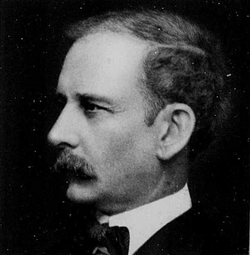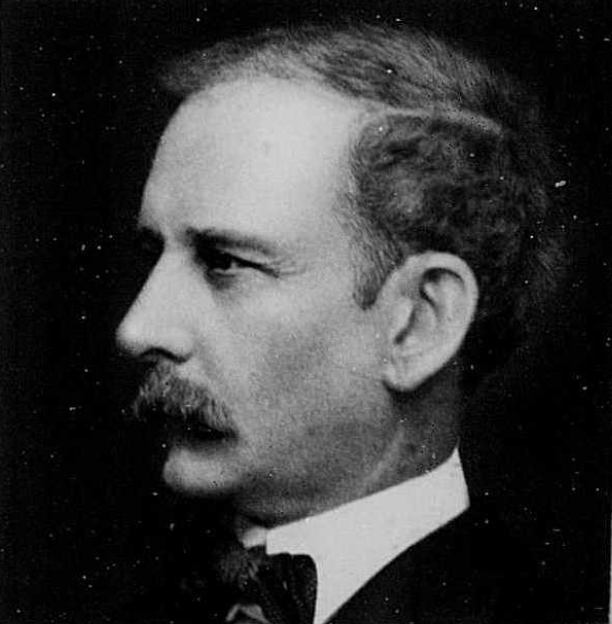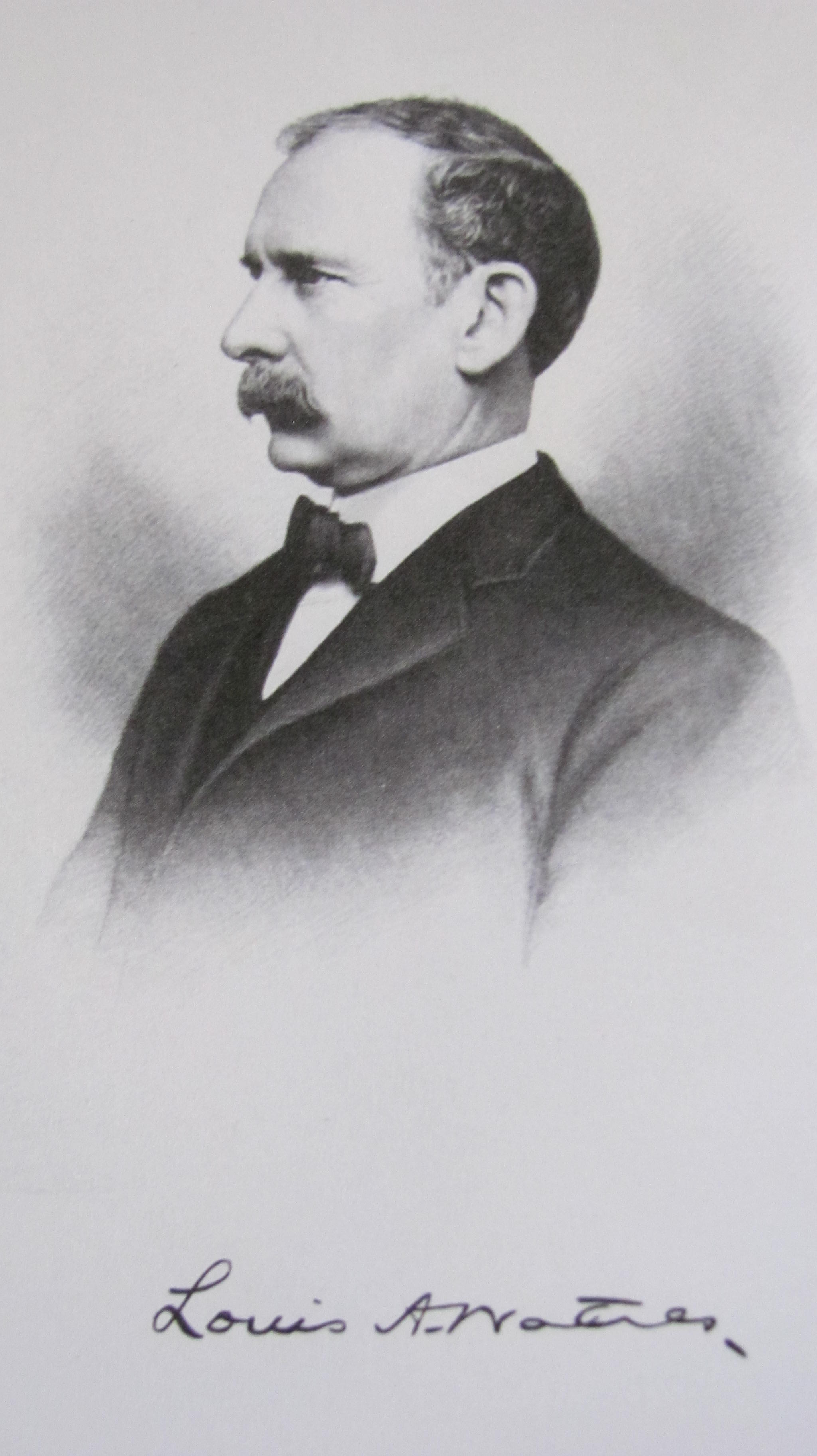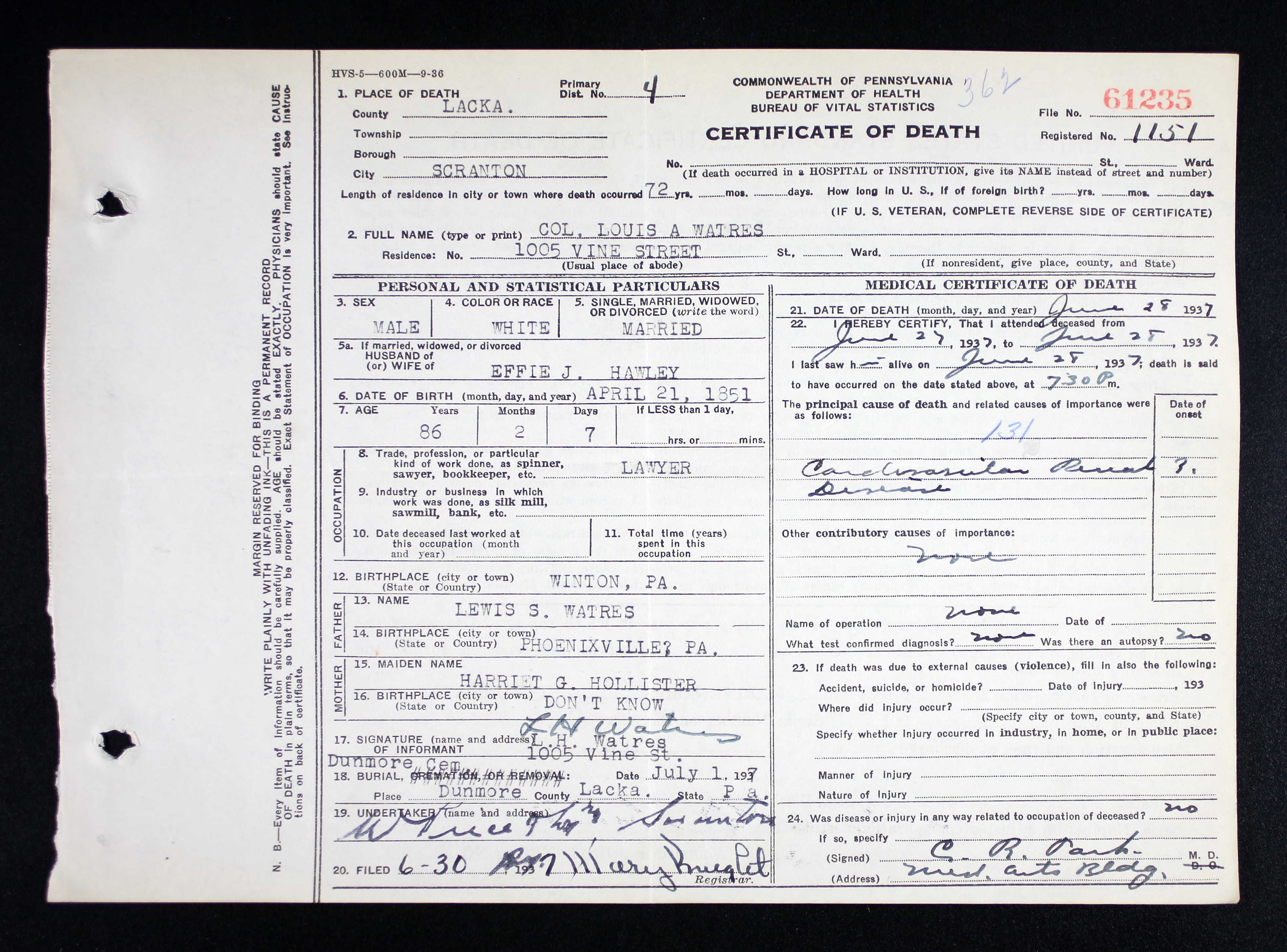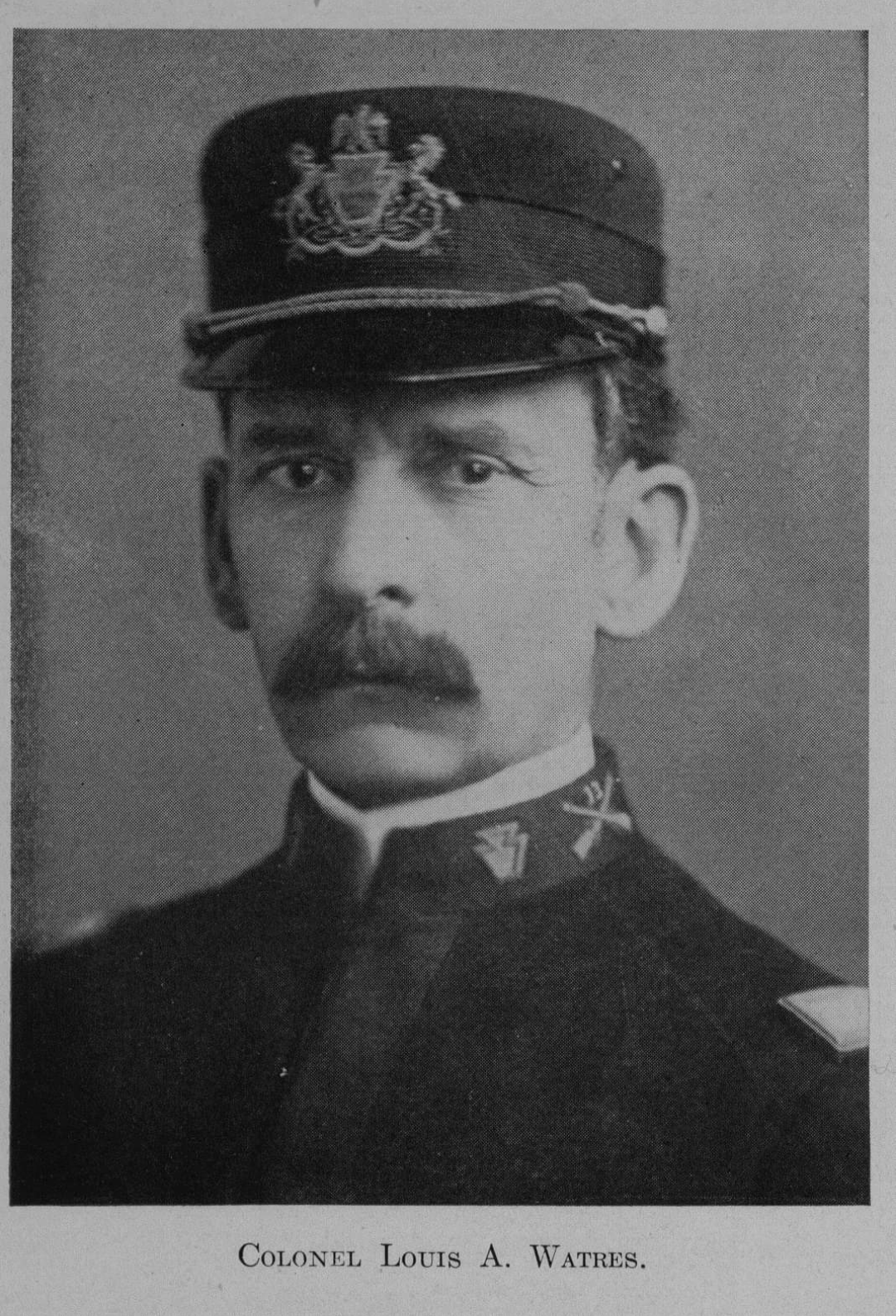Although little is known concerning the ancestral records of the family, it is definitely known that he is a descendant of the renowned James Otis, of Massachusetts, and the name Watres was closely associated with material, intellectual and moral progress in the Lackawanna Valley through the nineteenth century. Lewis S. Watres, father of Louis Arthur Watres, was born in Phoenixville, Pennsylvania, in 1808, and became a resident of the Lackawanna Valley when but twenty-seven years of age. He purchased four hundred acres of land in the vicinity of Winton and turned his attention to the utilization of the timber which he secured through this purchase. he was the proprietor of many of the business enterprises of his locality. To the name belongs the credit of the first coal mines of the valley below Carbondale. Prominent in political circle he served as justice of the peace in Blakely township, and following his removal to Scranton in 1865 he was elected alderman of the Ninth ward and by re-election was continued in that office until his death in 1882. When the Civil War was inaugurated his deep sympathy for the Union cause led him to recruit a company which was mustered in at Harrisburg and assigned to the Fifty-second Pennsylvania Infantry, but his ill health prevented him from going to the front. Later he formed another company which became part of the Fifty-sixth Regiment, and at home he put forth every possible effort to advance the cause of the Union and uphold the war policy of the president. His identification with moral progress dated from early manhood. In 1837 he erected the first church in the valley at Pecktown, it being of the Presbyterian denomination, and he bore the entire expense with the exception of twelve dollars contributed by others. While well fitted for leadership and exerting a strong and beneficial influence in public life it was his kindly spirit, his broad humanitarian principles, the depth of his character and his consideration for others that won him not only the friendship but the love of those with whom he was associated. He married Harriet G. Hollister, who possessed superior poetic talent and who wrote many poems that became popular and which were published over the pseudonym of "Stella of Lackawanna." Some of these since her death have been published in book forms in a volume entitled, "Cobwebs." Mr and Mrs. Lewis S. Watres became the parents of four children: Mrs. John L. Hull: Charles: Louis Arthur: and Carrie, who became the wife of Judge Edward C. Lovell, of Elgin, Illinois and died in the winter of 1896.
Louis Arthur Watres was born April 21, 1851, in what is now Winton, Lackawanna county, and his early common school privileges were cut short by the necessity of earning his own livelihood. He was employed in various ways, meanwhile attending night school, and at an early age he secured a position as teller with the Merchants and Mechanics Bank of Scranton, and later became cashier of the County Saving Bank and Trust Company of Scranton. It was his ambition, however, to become a member of the legal fraternity, and applying himself assiduously to the mastery of the legal principles he was enabled to successfully pass the examinations that secured him admission to the Lackawanna bar in 1878. he entered upon practice with a laudable ambition to win a foremost place among the attorneys of Scranton, and gradually advanced until he gained a distinctively representative clientage. His knowledge of the law is comprehensive and exact. The energy and determination which he manifested in his early business career aided him greatly in fitting himself for his chosen profession. Various business enterprises have also felt the stimulus of his efforts and keen business foresight, and have benefited by his wise and counsel and discernment. he is a stockholder and director in various corporations in the Scranton and Lackawanna Valley, and assisted in the organization of the Scranton Passenger Railway Company, of which he became president. He is the president of the County Savings & Trust Company, of The Title Guarantee & Trust Company, of the Spring Brook Water Supply Company, of the Mansfield Water Company, of the Economy Light, Heat & Power Company, of the Pittston Slate Company, and of the Boulevard Company.
His study of the political issues and questions of the day and his fitness for leadership have won him prominence as a representative of the Republican party of Pennsylvania, and his political career has been an honor to the state that has honored him. In 1881 he was elected county solicitor of Lackawanna county and retained that office until 1890. he was state senator from 1883 to 1891, exercising a commanding influence in that body, and initiating and aiding in the enactment of the most important measures during that long and eventful period. His retirement from the senate was only due to his advancement, he being elected lieutenant governor in the last year of is senatorial service. His election to the more august position was a splendid tribute to his character and worth, his plurality being 22,365, while the candidate for governor (Pattison) on the opposing democratic ticket was elected by a plurality of 17,000. he held his high office for a term of four years, being exofficio president of the senate and ex-officio president of the board of pardons. All these weighty responsibilities were worthily borne, and his official record was pronounced as praiseworthy in the highest degree. By act of the general assembly he was made a commissioner from Pennsylvania to the World's Columbian Exposition at Chicago and subsequently he was elected vice-president of the board. In August, 1891, he was chosen chairman of the Republican state committee, and had for a third of a century been active in molding the affairs of the Republican party and guiding its interests in Pennsylvania. For many years he was an earnest advocate of personal registration and uniform primary laws, which have just been enacted into laws, and he has always stood for the best and purest politics.
Colonel Watres has long been actively identified with the National Guard of the state, and during his military career has been largely instrumental in promoting the efficiency of that magnificent corps. His service began in 1877, continuing until 1891, and he again served from August, 1898 to august, 1904. for seven years he was captain of Company A, Thirteenth Regiment. From 1887 to 1891 he was a member of the governor's staff, as inspector of rifle practice, with the rank of colonel. He subsequently became colonel of the Eleventh Regiment Provisional Guard, and on its return from the field and muster-out of service, he became colonel of the Thirteenth Regiment National Guard of Pennsylvania. he was the first president of the National Guard Association of Pennsylvania, and held the office for two years.
In 1874 Mr. Watres was married to Miss Effie Hawley, and they have three sons: Harold, recently deceased: Laurence and Reyburn. Colonel Watres had a wide and favorable acquaintance throughout the state, having been the associate and co-laborer of many of the most distinguished men of Pennsylvania, while in his home locality where he is best known he has secured that closer warmer feeling which is termed friendship, and which arises from the commendable personal traits of the individual.
The Wyoming and Lackawanna Valleys
Page 60, 61 & 62
Although little is known concerning the ancestral records of the family, it is definitely known that he is a descendant of the renowned James Otis, of Massachusetts, and the name Watres was closely associated with material, intellectual and moral progress in the Lackawanna Valley through the nineteenth century. Lewis S. Watres, father of Louis Arthur Watres, was born in Phoenixville, Pennsylvania, in 1808, and became a resident of the Lackawanna Valley when but twenty-seven years of age. He purchased four hundred acres of land in the vicinity of Winton and turned his attention to the utilization of the timber which he secured through this purchase. he was the proprietor of many of the business enterprises of his locality. To the name belongs the credit of the first coal mines of the valley below Carbondale. Prominent in political circle he served as justice of the peace in Blakely township, and following his removal to Scranton in 1865 he was elected alderman of the Ninth ward and by re-election was continued in that office until his death in 1882. When the Civil War was inaugurated his deep sympathy for the Union cause led him to recruit a company which was mustered in at Harrisburg and assigned to the Fifty-second Pennsylvania Infantry, but his ill health prevented him from going to the front. Later he formed another company which became part of the Fifty-sixth Regiment, and at home he put forth every possible effort to advance the cause of the Union and uphold the war policy of the president. His identification with moral progress dated from early manhood. In 1837 he erected the first church in the valley at Pecktown, it being of the Presbyterian denomination, and he bore the entire expense with the exception of twelve dollars contributed by others. While well fitted for leadership and exerting a strong and beneficial influence in public life it was his kindly spirit, his broad humanitarian principles, the depth of his character and his consideration for others that won him not only the friendship but the love of those with whom he was associated. He married Harriet G. Hollister, who possessed superior poetic talent and who wrote many poems that became popular and which were published over the pseudonym of "Stella of Lackawanna." Some of these since her death have been published in book forms in a volume entitled, "Cobwebs." Mr and Mrs. Lewis S. Watres became the parents of four children: Mrs. John L. Hull: Charles: Louis Arthur: and Carrie, who became the wife of Judge Edward C. Lovell, of Elgin, Illinois and died in the winter of 1896.
Louis Arthur Watres was born April 21, 1851, in what is now Winton, Lackawanna county, and his early common school privileges were cut short by the necessity of earning his own livelihood. He was employed in various ways, meanwhile attending night school, and at an early age he secured a position as teller with the Merchants and Mechanics Bank of Scranton, and later became cashier of the County Saving Bank and Trust Company of Scranton. It was his ambition, however, to become a member of the legal fraternity, and applying himself assiduously to the mastery of the legal principles he was enabled to successfully pass the examinations that secured him admission to the Lackawanna bar in 1878. he entered upon practice with a laudable ambition to win a foremost place among the attorneys of Scranton, and gradually advanced until he gained a distinctively representative clientage. His knowledge of the law is comprehensive and exact. The energy and determination which he manifested in his early business career aided him greatly in fitting himself for his chosen profession. Various business enterprises have also felt the stimulus of his efforts and keen business foresight, and have benefited by his wise and counsel and discernment. he is a stockholder and director in various corporations in the Scranton and Lackawanna Valley, and assisted in the organization of the Scranton Passenger Railway Company, of which he became president. He is the president of the County Savings & Trust Company, of The Title Guarantee & Trust Company, of the Spring Brook Water Supply Company, of the Mansfield Water Company, of the Economy Light, Heat & Power Company, of the Pittston Slate Company, and of the Boulevard Company.
His study of the political issues and questions of the day and his fitness for leadership have won him prominence as a representative of the Republican party of Pennsylvania, and his political career has been an honor to the state that has honored him. In 1881 he was elected county solicitor of Lackawanna county and retained that office until 1890. he was state senator from 1883 to 1891, exercising a commanding influence in that body, and initiating and aiding in the enactment of the most important measures during that long and eventful period. His retirement from the senate was only due to his advancement, he being elected lieutenant governor in the last year of is senatorial service. His election to the more august position was a splendid tribute to his character and worth, his plurality being 22,365, while the candidate for governor (Pattison) on the opposing democratic ticket was elected by a plurality of 17,000. he held his high office for a term of four years, being exofficio president of the senate and ex-officio president of the board of pardons. All these weighty responsibilities were worthily borne, and his official record was pronounced as praiseworthy in the highest degree. By act of the general assembly he was made a commissioner from Pennsylvania to the World's Columbian Exposition at Chicago and subsequently he was elected vice-president of the board. In August, 1891, he was chosen chairman of the Republican state committee, and had for a third of a century been active in molding the affairs of the Republican party and guiding its interests in Pennsylvania. For many years he was an earnest advocate of personal registration and uniform primary laws, which have just been enacted into laws, and he has always stood for the best and purest politics.
Colonel Watres has long been actively identified with the National Guard of the state, and during his military career has been largely instrumental in promoting the efficiency of that magnificent corps. His service began in 1877, continuing until 1891, and he again served from August, 1898 to august, 1904. for seven years he was captain of Company A, Thirteenth Regiment. From 1887 to 1891 he was a member of the governor's staff, as inspector of rifle practice, with the rank of colonel. He subsequently became colonel of the Eleventh Regiment Provisional Guard, and on its return from the field and muster-out of service, he became colonel of the Thirteenth Regiment National Guard of Pennsylvania. he was the first president of the National Guard Association of Pennsylvania, and held the office for two years.
In 1874 Mr. Watres was married to Miss Effie Hawley, and they have three sons: Harold, recently deceased: Laurence and Reyburn. Colonel Watres had a wide and favorable acquaintance throughout the state, having been the associate and co-laborer of many of the most distinguished men of Pennsylvania, while in his home locality where he is best known he has secured that closer warmer feeling which is termed friendship, and which arises from the commendable personal traits of the individual.
The Wyoming and Lackawanna Valleys
Page 60, 61 & 62
Family Members
Sponsored by Ancestry
Advertisement
Explore more
Sponsored by Ancestry
Advertisement
